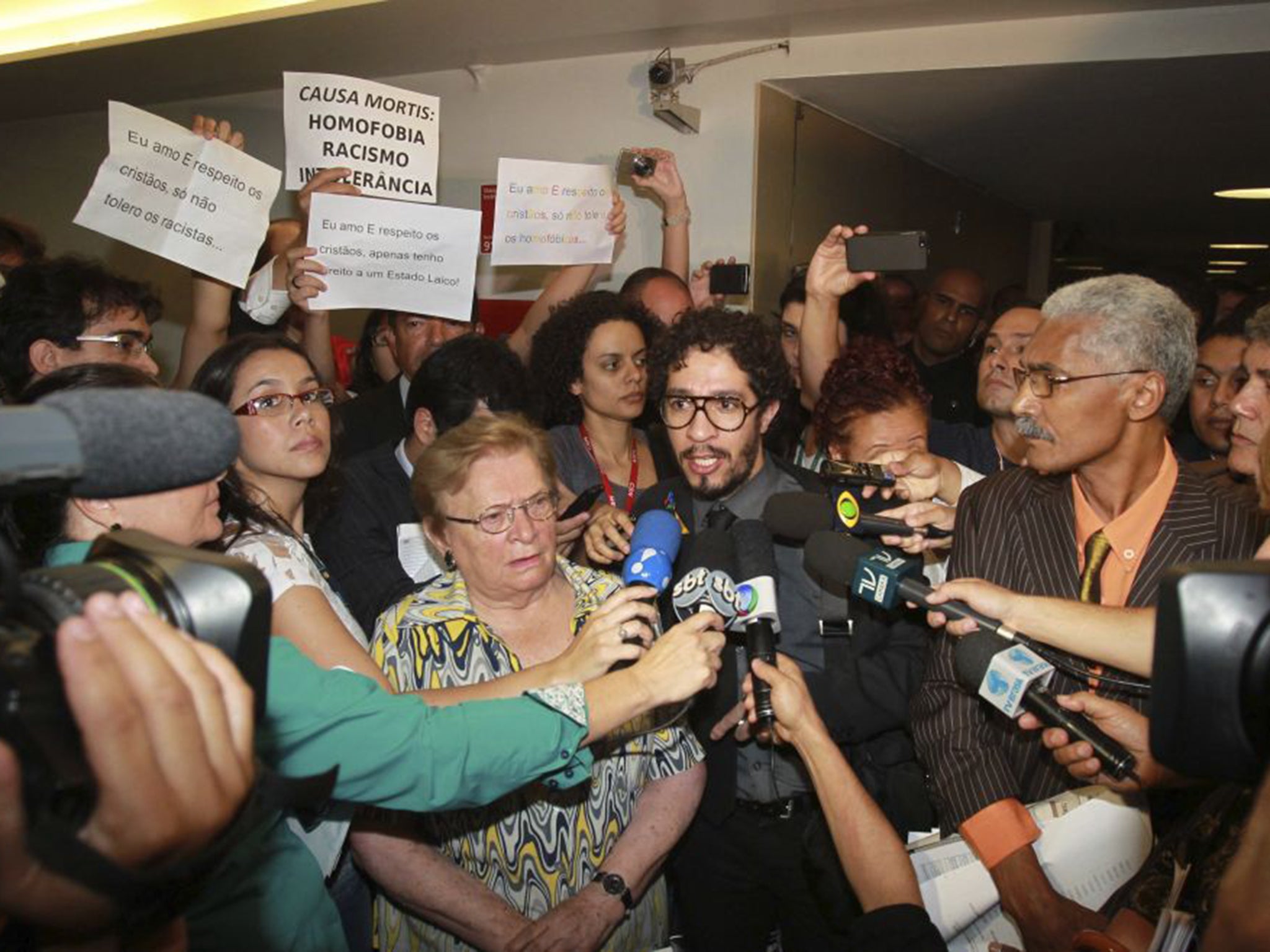Brazil's only openly gay MP Jean Wyllys de Matos Santos leads the fight to legalise abortion

Your support helps us to tell the story
From reproductive rights to climate change to Big Tech, The Independent is on the ground when the story is developing. Whether it's investigating the financials of Elon Musk's pro-Trump PAC or producing our latest documentary, 'The A Word', which shines a light on the American women fighting for reproductive rights, we know how important it is to parse out the facts from the messaging.
At such a critical moment in US history, we need reporters on the ground. Your donation allows us to keep sending journalists to speak to both sides of the story.
The Independent is trusted by Americans across the entire political spectrum. And unlike many other quality news outlets, we choose not to lock Americans out of our reporting and analysis with paywalls. We believe quality journalism should be available to everyone, paid for by those who can afford it.
Your support makes all the difference.Jean Wyllys de Matos Santos does not pick the easy battles, nor does he pick the vote-winning ones.
The first openly gay MP in Brazil, Mr Wyllys has always championed the conservative country’s minorities, whether they are gay, black, abused or exploited. But his latest fight concerns everyone. Women’s reproductive rights, including the right to abortion, is a matter for men as well, he insists.
In Brazil, abortion remains illegal except in cases of rape, or if the mother’s life is in danger or the foetus is developing with anencephaly, a rare and usually fatal brain abnormality.
But estimates suggest there are as many as a million clandestine terminations every year, often in unsafe circumstances that result in hospitalisation. The penalty for having an abortion in Brazil is up to three years in prison.
“The issue is that abortion criminalises women,” Mr Wyllys told The Independent. “However, if pregnancy is not just a women’s issue, neither is abortion. If the law criminalised men for abortion, it would have been legalised long ago.”
Mr Wyllys, a Rio de Janeiro MP for the Socialism and Freedom Party, is proposing a sexual health bill that would legalise abortion and recognise a woman’s right to choose. The draft legislation, the first in more than 20 years to tackle the issue, proposes that abortion is not only decriminalised but also legalised and treated as a right enshrined by law.
“The first thing we have to understand is that independent of my will, your will, or the dogmas of any religion, abortion is already being practised in Brazil,” the softly spoken politician said.
“The bill seeks to ensure that abortion is available on the health system to stop women having clandestine abortions, alone or in inadequate places, in which the risk to life only increases.”

Under the Brazilian legislative system, a draft bill, once filed, must pass through various committee readings for revisions before it can be voted on. The process can take decades and still be shelved. But for Mr Wyllys, it is an opportunity for the subject to be debated, not just within the chamber but in public as well.
He said the idea for the proposed law emerged during his first term but he delayed until he had consulted with women’s rights groups.
“I’m just a partner in this fight,” he said. “It was a project constructed by women.”
The bill was inspired by a similar law passed in Uruguay in 2012, where the number of abortions fell from 33,000 a year to only 6,676 after legalisation. According to Mr Wyllys, abortion has become the fourth greatest cause of maternal mortality in Brazil, but the first among poor, black women.
“Fundamentalist and conservative MPs will say, ‘I’m against abortion because, if we legalise it, more women will have abortions’,” he said. “But it’s not true. Abortion is already practised and this position only leads to women dying.”

Experts suggest that half of the women who have abortions in Brazil require hospital treatment for complications. In August last year, 27-year-old Jandira Magdalena dos Santos Cruz disappeared in Rio de Janeiro after inadvertently arranging a termination with a criminal gang that ran a network of clandestine abortion clinics. Her charred and mutilated body was later discovered in a burnt-out car.
Beatriz Galli, 45, a member of the bioethics and bio rights commission of the Order of Lawyers of Brazil, was among those consulted over the proposed new law.
“It’s a very important and courageous initiative when many politicians in congress define themselves as religious and defend rights related to life from conception,” she said.
But for Mr Wyllys, recognising women’s ownership of their bodies is a battle for men too.
“This is one of our issues,” he said. “And we have to listen to women in this respect. When a woman says she is not ready to be a mother, she is not and she has to be respected. She is the owner of her body.”
Join our commenting forum
Join thought-provoking conversations, follow other Independent readers and see their replies
Comments